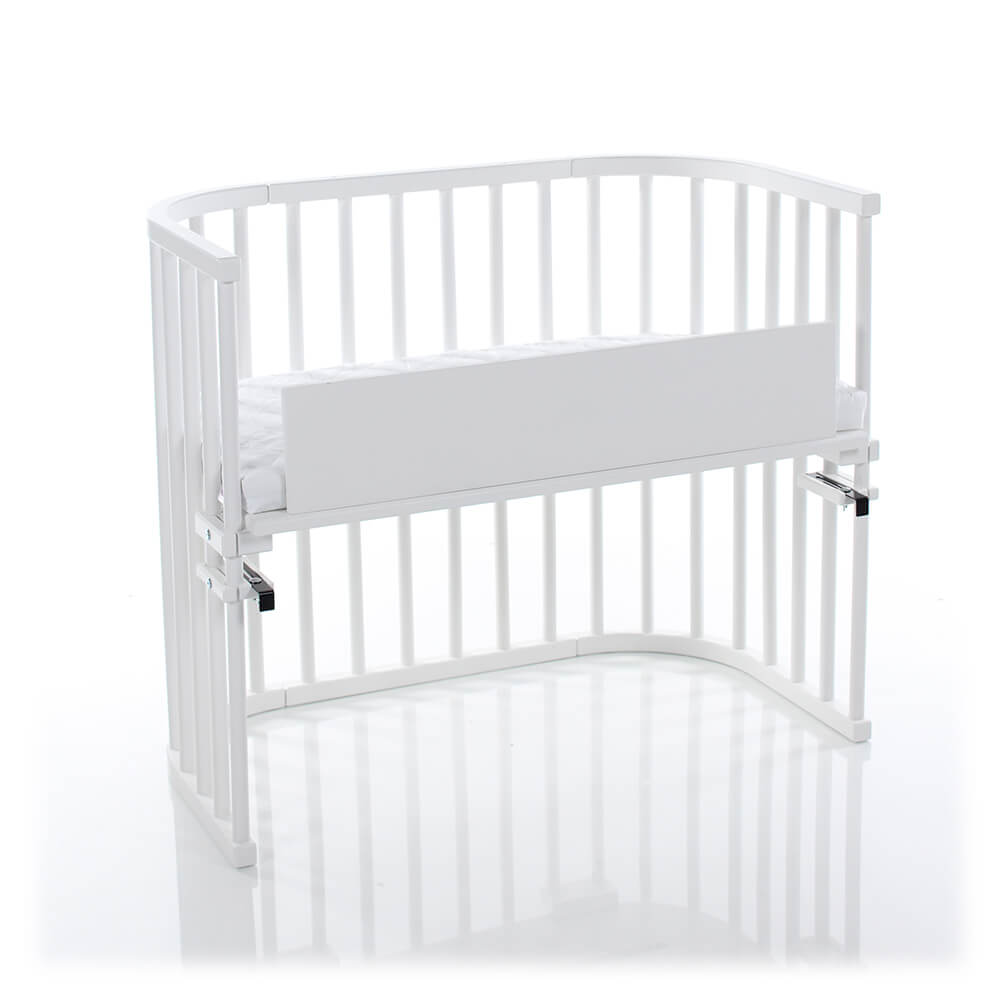It’s a familiar feeling for many parents: You’ve gone through a relaxing bedtime routine. Helped your newborn baby get comfortable in their crib or bedside co-sleeper. And now you’re just waiting for the snores to come. But you have a baby fighting sleep, which means as hard as you try to help your little one drift off to dreamland…they just won’t settle into sleep.
When it comes to sleep, babies aren’t so different from adults.
Sometimes they’re perfectly tired — so tired that they immediately drift off as soon as your head hits the mattress.
But other times, something is standing in their way. Whether that “something” is over-exhaustion, an unmet need (like hunger), or one of the other reasons on our list below, one thing is sure: helping them settle into sleep needs to be Priority #1 if you want to wake up in the morning without groggy eyes. 
So why won’t your baby finally get the rest they need? And what can you do about it?
We’re about to break it down and tell you what might be wrong and how you can help, step by step.
Why Is My Baby Fighting Sleep?
If your baby is fighting sleep, they’re most likely:
- Overtired
- Not tired at all
- Overstimulated
- Still adjusting to a new sleep schedule
- Uncomfortable, because they have needs that still have to be met
- Feeling a little sick
- Experiencing separation anxiety
The good news is that all of these are manageable—as long as you know what to do!
And once you help care for the underlying cause of why your baby is fighting the sleep they need, you’ll find it easy to nurture them toward rest.
(If you’re on the other side of the screen right about now thinking “but how will I know which of these is the problem?!” — don’t worry, we’ll give you tips for figuring that out too.)
When Your Baby Won’t Sleep Because They’re Overtired (Or Not Tired At All)

Babies sleep a lot. Which sure, shouldn’t come as a surprise to any parent.
But what might come as a surprise? You can expect your newborn baby to need between 14-17 hours a day. Which means that your little one will spend more hours a day asleep than they will awake!
Despite needing a lot of sleep, it can be hard for newborn babies to find the right balance between rest and wakefulness.
Babies have a small window when sleep becomes easy for them. If you lay them down when the time is right, they’ll be able to quickly close their eyes and enjoy their slumber with ease.
But if you miss that window—either by asking them to go to bed before they’re ready or by putting them to bed long long after they’re ready—they’ll likely struggle to catch those much-needed Zs.
How Overstimulation Makes It Hard for Your Baby to Get Sleep
How do you know if you’ve missed your baby’s perfect sleep window? Much of the time, it comes down to the level of stimulation they experience before being laid down to bed.
Babies are naturally social creatures. If they sense that some snuggle time is on the horizon, they’ll fight off dreamland for as long as they can. Everything from a phone screen to noisy toys to doting visitors can make babies feel like it’s near-impossible to calm down. Everything, that is, that clues them in that fun and entertainment is on the horizon for them.
Overstimulated babies are hard to put to bed. They’ll show you that they’re feeling the overstimulated energy by:
- Crying excessively
- Covering their eyes
- Having glazed over eyes, or a clear sense of tension in their body
- Turning their head away
- Making jerky movements, especially with their legs
Once your baby is in an overstimulation state, their circadian rhythm (the natural process that helps them feel wakeful during the day and restful at night) becomes disturbed. They’ll need more help falling back into a state of restfulness.
Which might mean more support form you in the form of gentle massage, quiet nurturing, and care in the kind of quiet and dark room that clues them in that it’s time to settle.
How to Avoid Overstimulation At All

To avoid overstimulated babies—and the kind of stress that puts on you!—try to create the kind of nurturing bedtime routine that will set your little one up for nighttime success. Turn on some calming music, put the screens away, and get them ready to snooze before bedtime comes by creating the kind of nurturing sleep environment they crave.
What Happens When They’re Adjusting to Their New Baby Sleep Schedule
It might be easy for you to set a baby sleep schedule for your newborn, but that doesn’t mean it’s easy for them to follow.
That’s because it takes a while for babies to develop their circadian rhythm, and it’s only natural that they feel some confusion throughout the transition.
In fact, it can take about 12 weeks for your newborn baby to develop their circadian rhythm.
During that building process, they’re going to have trouble understanding why certain hours of the day are devoted to sleep, while others are devoted to wakefulness.
It’s best to roll with this period of growth the best you can, while establishing a quiet and calm bedtime routine (think: dark rooms, gentle reading) that sets them up to snooze, even as their body and works hard to understand the why behind having to sleep during certain hours of the night.
Helping Your Baby Sleep By Checking That All Their Needs Are Met
If your baby isn’t sleeping, it might be worth a double-check to make sure they’re not hungry, in need of a diaper change, or otherwise needing a little extra help getting comfy.
Your baby’s body has a clear hierarchy of needs, and hunger is right at the top of that list. If they’re sleepy enough, they might be able to fall asleep hungry or ignore some other issue in the form of a dirty diaper. But if that sense of hunger is overriding their want for sleep? They won’t be able to settle until they have that need fully met.
Your baby eats a lot during their first few years as they work on growing big and strong. (On average, you can expect your baby to eat 8 to 12 times within a 24-hour period.)
Even if it doesn’t seem like the time is right for nighttime nursing, a little extra hunger could be keeping them awake. Checking that all those basic needs are taken care of is often the easiest — and most helpful — path to helping your little one settle down.

When You Have a Baby Fighting Sleep Because of Illness
All it takes is a little cold or ear infection to turn your baby’s nights restless.
Though fever is often one of the biggest warning signs of illness that parents look for, it’s not the only way to tell that germs might be the cause of your baby’s sleeplessness.
A general change in behavior is often the quickest way to tell that your baby isn’t feeling too well. Irritability or persistent crying at bedtime might be a sign that your baby needs a quick trip to the doctor. And so too can weird patterns of over sleepiness during the night or day.
If you really can’t get your baby to sleep, it might be worth checking with your doctor. It might also be helpful to look for other signs or symptoms that might cue you in to whether illness is keeping your little one awake.
How Babies Feel Separation Anxiety (And Why It Affects Sleep)
Separation anxiety can keep your baby from peacefully settling down for sleep – which is totally normal!
During a very particular stage of their development (that starts around the 6 month mark), your baby will start to feel frustrated when they feel like their parents are far away. 
This is a natural part of their development, and reflects how comfortable they feel in your care. As well as how excited they are by the thought of trading time sleeping alone for some quality time socializing with you.
But if separation anxiety in your baby is keeping your whole family awake, offering your baby a calming way of feeling your presence can help.
For many families, choosing to sleep with a bedside co-sleeper can ease some of these early sleep concerns and make nighttime nursing and comforting easier by keeping your baby no more than an arm’s reach away. So can setting up a bassinet by the bed, or otherwise keeping your baby within easy arm’s reach through the night.
With a baby sleep tool like this by your bedside, it can take away all your concerns about baby fighting sleep and offer more peaceful nights of rest for them—and you!
The Takeaway: What Do I Do When My Baby Is Fighting Sleep?
When it comes to helping your baby get better rest, consistency will always be key. Setting a consistent bedtime routine can help your little one easily know when it’s time to trade the social hours of the day for the quiet hours of the night.
With things kept consistent, it will also be easier for you to tell when something outside the ordinary (like a sense of overstimulation or a small illness) could be upsetting your little one and making it harder to settle down.
So that you can offer care however they need it, and set the stage for better nights of rest for the whole family. Today, and all the many love-filled days to come.







